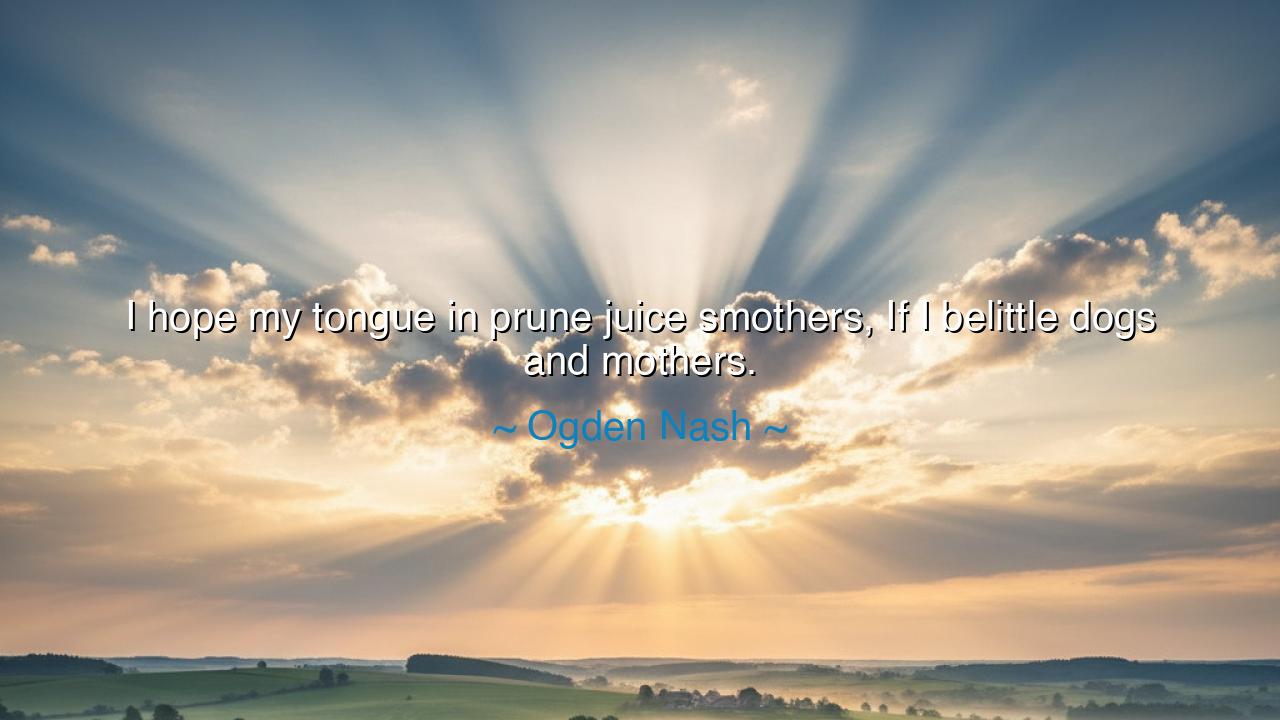
I hope my tongue in prune juice smothers, If I belittle dogs and






In the councils of laughter, where wit must wear a bridle, hear Ogden Nash swear a playful yet solemn oath: “I hope my tongue in prune juice smothers, / If I belittle dogs and mothers.” In a couplet light as a feather and heavy as a vow, he binds his own tongue to mercy. The punishment he imagines—prune juice smothers—is comic, but the commandment is ancient: do not scorn what is loyal and what gave you life. The jest is a covenant disguised as a grin.
The meaning is double. First, Nash names two emblems of goodness that a decent heart should not mock: dogs, those everyday ministers of fidelity; and mothers, the archetype of nurture. To belittle either is to insult the very sources of comfort and belonging. Second, he polices his instrument—the tongue—because speech is the craftsman’s tool and the citizen’s weapon; left unruled, it wields harm faster than a hand. By threatening his own mouth with a comic doom, he models a discipline of humor that refuses cruelty while keeping its sparkle.
The origin of the line is firm. It appears in Nash’s poem “Compliments of a Friend,” first published in The New Yorker (Dec. 4, 1948) and then collected in his 1949 volume Versus. In the poem’s received text, the line often reads “If I belittle dogs or mothers,” framed by a stanza that teases the clichés “Mother is a boy’s best friend” and the dog as man’s best friend—before Nash confesses, with impish honesty, that his own best friend is “Me.” The couplet thus stands at a crossroads of satire and self-rebuke: he will not sneer at the sacred, even while he winks at the self.
Notice how the humor works like a safety catch. Prune juice, the homely elixir of contrition, becomes the bath that would smother a reckless tongue—an image so ridiculous it stays in the mind and checks the mouth. This is the old wisdom of the jester who loves the village more than the laugh; he will skewer pretension, yes, but he will not stab devotion. The couplet is an ethic for talkers and texters alike: make fun of the mighty and the merciless; spare the faithful and the fruitful.
A small story makes it plain. A young radio host, eager to be “edgy,” riffed one night about a caller’s stammer and the way her dog whined in the background; the audience chuckled, the clip traveled, and the caller’s mother wrote a quiet letter saying she wished the host knew how that dog steadied her daughter after hospital shifts and how that voice on the phone had learned to sing lullabies between surgeries. The host read the letter on air, throat tight, and vowed that future jokes would land up the chain—at pretension, fakery, and fraud—never down the chain, at loyalty and care. He did not cease to be funny; he became cleanly brave.
History keeps the same ledger. Cultures flourish when they honor what binds them—home, hospitality, the beasts that serve them; they decay when cleverness corrodes gratitude. The Greeks warned of tongues that “outrun thought,” and the sages taught that blessing and cursing should not flow from the same spring. Nash’s couplet slips into this chorus with a wink: it is easier to remember a rule when it rhymes, and easier to obey it when it makes you smile.
What, then, shall we learn? First, set a guard on the tongue: before you jest, ask whether the laugh punches down or lifts up. Second, establish sacred precincts where jokes do not tread—keep mothers and acts of care outside the target range, and treat dogs (and all the humble loyalties they stand for) as off limits. Third, practice reparative speech: if you do wound, answer with praise spoken in public and apology offered in private, swiftly and without excuse.
Carry the cadence like a pocket charm: tongue—prune juice—smothers; belittle—dogs—mothers. Let it sweeten the edge of your wit and steady your aim. For the best jesters serve the common good: they puncture pride, defend tenderness, and leave a room braver and kinder than they found it. Nash’s oath invites us into that guild—masters of merriment who remember, even while we laugh, what must never be made small.






AAdministratorAdministrator
Welcome, honored guests. Please leave a comment, we will respond soon